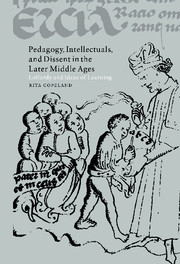Book contents
- Frontmatter
- Contents
- Acknowledgments
- General introduction: pedagogy and intellectuals
- PART 1 From pedagogies to hermeneutics: childhood, the literal sense, and the heretical classroom
- 1 Revaluing the literal sense from antiquity to the Middle Ages
- 2 Lollardy and the politics of the literal sense
- PART 2 Violent representations: intellectuals and prison writing
- Bibliography
- Index
- CAMBRIDGE STUDIES IN MEDIEVAL LITERATURE
1 - Revaluing the literal sense from antiquity to the Middle Ages
Published online by Cambridge University Press: 22 September 2009
- Frontmatter
- Contents
- Acknowledgments
- General introduction: pedagogy and intellectuals
- PART 1 From pedagogies to hermeneutics: childhood, the literal sense, and the heretical classroom
- 1 Revaluing the literal sense from antiquity to the Middle Ages
- 2 Lollardy and the politics of the literal sense
- PART 2 Violent representations: intellectuals and prison writing
- Bibliography
- Index
- CAMBRIDGE STUDIES IN MEDIEVAL LITERATURE
Summary
It is now a commonplace, certainly a well-grounded one, to speak of the intellectual culture of late antiquity in terms of the devolution from republican political ideology and the constriction, or auto-telism, of many forms of learning that had earlier been integrated in the larger discourses of civic life. There has been much said about the narrowness or fragmentation of grammatical teaching and erudition, and similarly about the narrowed and self-referential scope of rhetorical learning, even as the technical refining of these arts is among the most massive scholarly efforts of the period. We also have the more general picture of philosophy as the retreat into “care of the self,” where the private self has become the only stable moral fixture for protection against the vagaries and violence of public political life. Even if some of these observations have been made in the spirit of “humanist” critique of an age of intellectual “decadence” (the term “decadent” appears with some regularity in discussions of late antiquity), they are nonetheless valid as observations about cultures of learning in the Empire, especially after the third century.
Within this large intellectual milieu, the picture that we must trace out is formed around an ideology of “depth” and “surface” in late-antique representations of textual engagement. In the schools and intellectual culture of later antiquity, the grammarian was recognized as the master of textual surface.
- Type
- Chapter
- Information
- Pedagogy, Intellectuals, and Dissent in the Later Middle AgesLollardy and Ideas of Learning, pp. 55 - 98Publisher: Cambridge University PressPrint publication year: 2001



